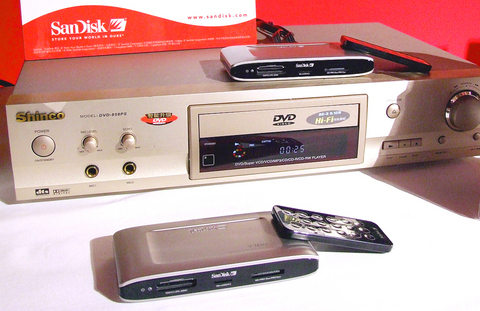Targeting the rising number of mobile device users in Taiwan, SanDisk Corp, the world's largest maker of flash memory storage cards for electronic devices, yesterday unveiled a video memory card recorder that allows users to watch recorded video content on their cellphones, personal digital assistants or even handheld game consoles.
With V-Mate the video memory card recorder, users can record content from video inputs such as over-the-air, cable and satellite television, DVD players, personal video recorders like TiVo and video cassette recorders, onto their flash memory cards.
Measuring 13cm in length, 6.6cm in width and 2.032cm in thickness, the V-Mate is a compact alternative to bulky video tape recorders as it can also play back recorded video content. V-Mate is especially useful for people who do not have the time to sit and watch TV at home. After recording a program at home, users can take the memory card and play the content on their mobile devices wherever they go.

PHOTO: KE LI-HSIN, TAIPEI TIMES
"People who are always on the go will not miss their favorite TV shows," Gavin Wu (
The V-Mate can record up to 3.5 hours of high quality video per gigabyte by using industry-standard video formats. It supports almost all widely used memory cards, including SD, miniSD, microSD or Memory Stick PRO Duo cards.
The product is scheduled to hit the shelves next month at a suggested retail price of NT$4,599 (US$140.45), Wu said.
SanDisk also unveiled its latest digital music player, the Sansa c200, which is a middle-end product designed to lure price-sensitive buyers.
SanDisk has about a 10 percent share of the digital music player market, trailing a distant second to Apple Computer Inc's iPod series.
Featuring a bright LCD color screen and a microSD expansion slot, the Sansa c200 supports MP3, WMA and the protected WMA digital rights management (DRM) formats that enable users to purchase music files from most online music providers.
Meanwhile, Wu said despite weak consumer spending this year, the company is positive about sales prospects this holiday season. With an increasing number of digital gadgets being introduced in the market, the demand for storage devices with larger capacities is on the rise, Wu said.

A proposed 100 percent tariff on chip imports announced by US President Donald Trump could shift more of Taiwan’s semiconductor production overseas, a Taiwan Institute of Economic Research (TIER) researcher said yesterday. Trump’s tariff policy will accelerate the global semiconductor industry’s pace to establish roots in the US, leading to higher supply chain costs and ultimately raising prices of consumer electronics and creating uncertainty for future market demand, Arisa Liu (劉佩真) at the institute’s Taiwan Industry Economics Database said in a telephone interview. Trump’s move signals his intention to "restore the glory of the US semiconductor industry," Liu noted, saying that

On Ireland’s blustery western seaboard, researchers are gleefully flying giant kites — not for fun, but in the hope of generating renewable electricity and sparking a “revolution” in wind energy. “We use a kite to capture the wind and a generator at the bottom of it that captures the power,” said Padraic Doherty of Kitepower, the Dutch firm behind the venture. At its test site in operation since September 2023 near the small town of Bangor Erris, the team transports the vast 60-square-meter kite from a hangar across the lunar-like bogland to a generator. The kite is then attached by a

Foxconn Technology Co (鴻準精密), a metal casing supplier owned by Hon Hai Precision Industry Co (鴻海精密), yesterday announced plans to invest US$1 billion in the US over the next decade as part of its business transformation strategy. The Apple Inc supplier said in a statement that its board approved the investment on Thursday, as part of a transformation strategy focused on precision mold development, smart manufacturing, robotics and advanced automation. The strategy would have a strong emphasis on artificial intelligence (AI), the company added. The company said it aims to build a flexible, intelligent production ecosystem to boost competitiveness and sustainability. Foxconn

Leading Taiwanese bicycle brands Giant Manufacturing Co (巨大機械) and Merida Industry Co (美利達工業) on Sunday said that they have adopted measures to mitigate the impact of the tariff policies of US President Donald Trump’s administration. The US announced at the beginning of this month that it would impose a 20 percent tariff on imported goods made in Taiwan, effective on Thursday last week. The tariff would be added to other pre-existing most-favored-nation duties and industry-specific trade remedy levy, which would bring the overall tariff on Taiwan-made bicycles to between 25.5 percent and 31 percent. However, Giant did not seem too perturbed by the